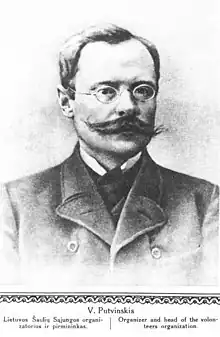Vladas Pūtvis-Putvinski | |
|---|---|
 Vladas Putvinskis | |
| Born | 6 October 1873 |
| Died | 5 March 1929 |
| Nationality | Lithuanian |
| Other names | Vladas Pūtvis |
| Occupation(s) | Activist, paramilitary leader |
| Known for | Founder of the Lithuanian Riflemen's Union |
Vladas Pūtvis-Putvinskis or Vladas Pūtvis (6 October 1873 – 5 March 1929) was a Lithuanian paramilitary leader, one of the founders of the Lithuanian Riflemen's Union, a politician, social activist, and author in pre-war and interwar Lithuania.[1]
Biography
Born in Riga in 1873, then part of the Russian Empire, to a family of Polish-Lithuanian gentry, after 1896 Putvinskis became passionately involved in the Lithuanian Nationalist movement. Arrested multiple times by the Tsarist government, he was finally deported to central Russia as a security risk during the First World War. After the outbreak of the Russian Revolution in 1917, he made his way to Ukraine, and worked with a "Ukrainian Self-Defense Guard". Inspired by these paramilitaries and others, upon returning to Lithuania in 1918, amidst the context of the Lithuanian-Soviet War of 1918-19, he began to accumulate an arsenal and organize a small community of nationalists which would eventually merge with nationalist movements directed by figures such as Matas Šalčius to become the Lithuanian Riflemen's Union in 1919. Putvinskis became the first commander of the LRU upon its foundation.[2]
Putvinskis would resign from his role as the commander of the LRU in July 1922 after accusations of corruption and nepotism made by the press, following a general backlash to the LRU after violence between Paramilitary soldiers and those belonging to the state. Putvinskis is said to have taken the allegations very personally, given his lifelong concern with the moral hygiene of the nation, contributing to his decision to resign.[3]
Writing and influences
Putvinskis produced several works in multiple genres, most influentially including some Lithuanian nationalist propaganda works and some philosophical reflections. According to Tomas Balkelis, Putvinskis was greatly inspired by a Herderian view of the nation as an organic and spiritual body, and consequently sought to make the LRU not just a military unit, but a force for national and moral education and renewal. Putvinskis expressed his interest primarily in 'the nation', and expressed that he saw the state as ephemeral compared to the 'nation', so construed.[4]
References
- ↑ Tomas, Balkelis (2013). Gerwarth, Robert; Horne, John (eds.). "Turning Citizens into Soldiers: Baltic Paramilitary Movements after the Great War". War in peace: paramilitary violence in Europe after the Great War: 128–139.
- ↑ Tomas, Balkelis (2013). Gerwarth, Robert; Horne, John (eds.). "Turning Citizens into Soldiers: Baltic Paramilitary Movements after the Great War". War in peace: paramilitary violence in Europe after the Great War: 128–132.
- ↑ Tomas, Balkelis (2013). Gerwarth, Robert; Horne, John (eds.). "Turning Citizens into Soldiers: Baltic Paramilitary Movements after the Great War". War in peace: paramilitary violence in Europe after the Great War: 139.
- ↑ Tomas, Balkelis (2013). Gerwarth, Robert; Horne, John (eds.). "Turning Citizens into Soldiers: Baltic Paramilitary Movements after the Great War". War in peace: paramilitary violence in Europe after the Great War: 131–2.